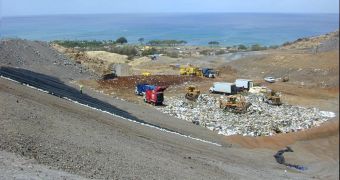For most of the developed countries, Ghana represents nothing more than an enormous landfill where electronics arrive form Europe and North America.
Our paperless offices save a few forests, but imply other risks, quite common in our modern society. Toxic compounds coming from out-of-fashion electronics which we no longer need or want threaten the wellbeing of the people living near the Agbogbloshie scrap metal site.
So far, authorities say that the public school, church and local market have been the most exposed to this source of contamination.
According to a study conducted to test the potential of the area, led by experts, the most powerful polluters are cadmium and lead. Scientists established that the quantity found in the dump is 50 times higher than its normal rate.
The people who work at the Agbogbloshie site say that the copper is recycled while the items are burned, but despite the fact that such activities shouldn't have a noticeable impact upon the health of individuals, apparently scientists stumbled across a significant amount of metals, which have been detected while analyzing the soil's composition.
The stored metals, like nickel, lead, chromium, cadmium and zinc can be found in most of the electronics and are know questioning the safety of the humans beings who work or live in that environment.
Experts say that most of the trash brought to the African landfill is “imported” from Europe and North America.
They also state that not only Ghana is in this hazardous situation, since most of the economical developed countries in the world consider poor nations to be the best candidates for storing trash.
"Until now, Ghana has not regulated the importation and management of e-waste. Although Ghana is a signatory to the Basel Convention (which regulates the import and export of hazardous wastes), rules are only now being incorporated into our national legal framework. The government hopes to have new rules in place next year,” said Atiemo Sampsonhe, a well-known Ghanan researcher.
The main impediment in coming up with effective solutions to this problem is the fact that going through the trash can be a profitable business.
The landfills often shelter treasures which are worth a considerable amount of money, like copper, silver or gold. Hundreds of people engage their efforts in “informal recycling in the Agbogbloshie scrap yard”, to be able to put food on the table on a daily basis.

 14 DAY TRIAL //
14 DAY TRIAL //